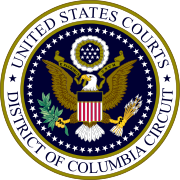Comcast Corp. v. FCC
| Comcast Corp. v. FCC | |
|---|---|
 |
|
| Court | United States Court of Appeals for the District of Columbia Circuit |
| Full case name | Comcast Corporation v. Federal Communications Commission and United States of America |
| Argued | January 8 2010 |
| Decided | April 6 2010 |
| Citation(s) | 600 F. 3d 642 |
| Holding | |
| The FCC does not have ancillary jurisdiction over Comcast's Internet service under the language of the Communications Act of 1934. | |
| Court membership | |
| Judge(s) sitting | Chief Judge David B. Sentelle; Circuit Judges Arthur Raymond Randolph and David S. Tatel |
| Case opinions | |
| Majority | Judge Tatel, joined by Chief Judge Sentelle and Judge Randolph |
Comcast Corp. v. FCC, 600 F.3d 642, is a 2010 United States Court of Appeals for the District of Columbia case holding that the Federal Communications Commission (FCC) does not have ancillary jurisdiction over Comcast's Internet service under the language of the Communications Act of 1934. In so holding, the Court vacated a 2008 order issued by the FCC that asserted jurisdiction over Comcast's network management policies and censured Comcast from interfering with its subscribers' use of peer-to-peer software.
On August 1, 2012, Comcast sued the FCC again regarding an order to distribute Tennis Channel equally with Golf Channel and Versus (Comcast Cable v. FCC & USA, No. 12-1337 (D.C. Cir.)).
In 2007, several subscribers of Comcast high-speed Internet discovered that Comcast was interfering with their use of peer-to-peer networking applications. Challenging Comcast's interference, Free Press and Public Knowledge—two non-profit advocacy organizations—filed a complaint with the FCC. The complaint stated that Comcast's actions violated the FCC Internet Policy Statement, particularly violating the statement's principle that “consumers are entitled to access the lawful Internet content of their choice... [and] to run applications and use services of their choice.” Comcast defended its interference with consumers' peer-to-peer programs as necessary to manage scarce network capacity.
Following this complaint, the FCC issued an order censuring Comcast from interfering with subscribers' use of peer-to-peer software—the FCC's second attempt to enforce its network neutrality policy with the first being the Madison River investigation. The order began with the FCC stating it had jurisdiction over Comcast's network management practices under the Communications Act of 1934 (47 U.S.C. § 154). Specifically, the Communications Act of 1934 granted the FCC the power to "perform any and all acts, make such rules and regulations, and issue such orders, not inconsistent with [the Act], as may be necessary in the execution of its functions." Next, the FCC ruled that Comcast impeded consumers' ability to access content and use applications of their choice. Additionally, because other options were available for Comcast to manage their network policy without discriminating against peer-to-peer programs, the FCC found that Comcast's method of bandwidth management breached federal policy.
...
Wikipedia
